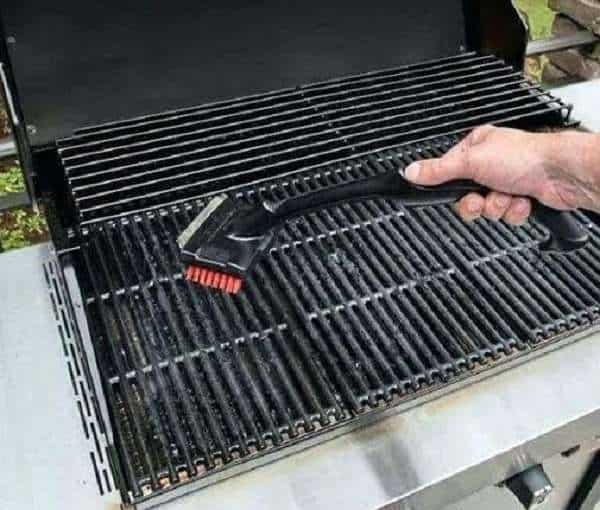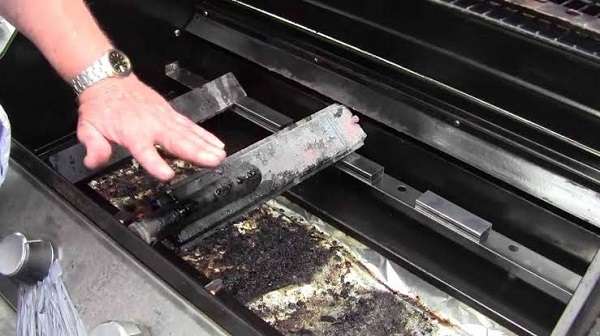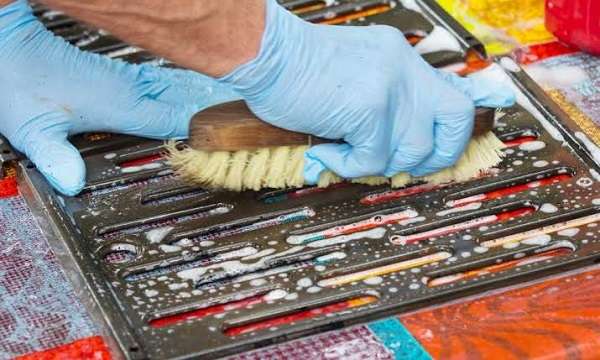How to clean cast iron grill grates weber? Grilling has been echoed by scientists as one of the safest ways of preparing meat. It stems from the fact that grilling presents an alternative to cooking without oil. Grilling grates are interlocking structures fitted on the surface of a grill. Iron is one of the most common metals used in making grill grates. That is because the metal is durable and can withstand heat at high temperatures.
However, as we all know, iron is prone to rust if exposed to water. Eating food contaminated with iron rust poses a severe health risk as it is likely to affect the intestinal tract. Regular cleaning of weber cast iron grill grates is necessary for a good grilling experience.
How to Clean cast Iron Grill Grates Weber
Indubitably, a plethora of distinct cooking surfaces crafted from cast iron grills exist in the market, yet one particular company, renowned for its exceptional manufacturing of grilling accessories, is Weber Grills. This company, in its unrelenting pursuit of grilling excellence, produces a myriad of diverse products composed of cast iron grills. However, as with all iron materials, these cooking surfaces are wont to succumb to the perils of loose iron rust due to their prolonged exposure to water.
Thus, it is an inescapable reality that the grates of these cast-iron surfaces will eventually rust, and it behooves you, the discerning consumer, to be suitably equipped with the knowledge of how to properly cleanse your cast-iron grates designated for use with Weber grills.

Cleaning Cast iron Grill Pans
Requirements
Kosher salt: Behold, a distinctive variant of kitchen salt that shuns the presence of iodine, commonly known as non-iodized salt. Its distinguishing feature lies in its markedly larger granule sizes, rendering it an exceptional abrasive agent in the realm of cleaning cast iron grills. It is worth noting that this form of salt, referred to as kosher salt, is solely composed of sodium chloride, which accounts for its enduring coarseness when interfaced with oil.
Water: To create an effective cleaning paste, mix the kosher salt with water.
Brush: Since the cast grills are made of iron, a nylon scrub brush will work perfectly without leaving residues on the cooking surface.
Cleaning Process
Mix the kosher salt with water and apply the paste on the surface of the grates on the pan. Thoroughly scrub the grates with a nylon brush. Once done, use clean water to rinse the paste off the surface of the grates and leave the cast iron grill pan to dry.
Cleaning Cast Iron Griddle
A griddle is a flat metallic surface used for cooking pancakes, bacon, and eggs. A cast-iron skillet receives its source of heat from underneath the cooking surface. The grill’s large surface area provides a suitable condition for preparing food for many people. You can freely flip eggs or pancakes while cooking with a cast iron grill.
Griddles can either be electric or non-electric. Electric grills are plugged into sockets for heating, while non-electric cast iron grills are placed on burners. Cast iron weber grills are the most common in the market. To effectively clean a cast iron grill, you will need the following:
- Damp rag or brush
- Protective gloves
- Detergent
It is worth noting that it is advisable to clean it immediately after proper care and maintenance of a cast iron grill.
Procedure for immediate cleaning of cast iron grill after use
- Wearing protective gloves, lift the hot weber skillet from the burner and take it to a sink.
- Run warm water on the grill to help remove food remnants before getting stuck.
- Using detergent and a damp rag, clean the grill thoroughly and rinse with water.
- Once dry, apply cooking oil on the grill and store for the next use.
Procedure for Cleaning a Cooled Cast Iron Griddle
Although it is recommended to clean Weber griddles promptly after use, circumstances may arise where you are faced with the task of cleaning an exceptional cast iron grill that has endured an extended period of neglect. In such cases, the utilization of kosher salt as an abrasive agent is indispensable. Herein lies the step-by-step guide to executing the arduous task of cleaning an overstayed grill.
- Soak the grill in hot water for 5 minutes
- Make a cleaning paste by mixing kosher salt with water
- Using a nylon brush, scrub the stuck food particles on the grill. Remember not to use metal to scrape stuck food off the grill.
- Rinse the grill and let it dry on a stove
- Apply cooking oil on the surface for protection and store for future use.
Cast Iron Grill Maintenance for First Time Use
Prudent advice dictates that one should always season a new Weber grill before embarking on its usage. The grill should first be cleansed using one of the two aforementioned procedures. Upon thorough drying, the surface of the grill ought to be liberally coated with vegetable oil before being inserted into a preheated oven for an hour.
Subsequently, the oven should be allowed to cool for half an hour, following which the grill can be extracted and wiped clean to eliminate any superfluous oil residues. Lastly, the griddle should be stowed away for future use. It is highly recommended that this curing process be repeated twice annually to ensure that future cleaning operations are expedited with ease.
Cleaning Burners
Non-electric cast iron grill that uses heat from charcoal or gas grills requires thorough maintenance in the lower interior. Stuck food particles are likely to find their way to the burner. Cleaning a burner is as important as cleaning the weber grill grates. Set aside a grill brush for cleaning the burners. It is advisable to avoid using the same brush you used in cleaning the cast iron grill grates. Be extra careful when cleaning gas burners to prevent damaging the jets.

The requirement for cleaning gas stove burners
- Nylon scrub brush
- Dry towel
- Baking soda
- Detergent
Procedure for Cleaning
- Mix detergent with lukewarm water and use the mixture to wash off the loosely attached film of dirt.
- Prepare a cleaning paste of baking soda and apply it on the burner. That will help soften the stuck food particles.
- Leave the paste for 30 minutes to help soften food that remains stuck on the burner.
- Scrub the burner thoroughly using a nylon brush to remove the softened food residue.
- Let the burner dry in readiness for the next use.
Daily Maintenance of gas stove burners
In order to ensure optimal functionality of both charcoal and gas stove burners, it is imperative that daily cleaning be incorporated into one’s routine. Such proactive measures not only aid in preserving the burners, but also significantly alleviate the burden of future cleaning tasks.
To this end, it is recommended that vinegar be applied on the burners on a daily basis and allowed to rest for a period of 20 minutes, before subsequently wiping the surface with a dry towel. This regimen serves to effectively eliminate any stubborn burn-on grease that may have accumulated on the surface of the burner, thus facilitating ease of use in subsequent cooking operations.
Cleaning Rust Iron Grill Grates
Cast iron grill grates are always coated with porcelain to help prevent rusting. Porcelain built-in of an inorganic compound comprising metals and non-metals. It is made by heating a clay mineral known as kaolin. Porcelain is tough and durable; it can withstand heat at high temperatures. This property makes it suitable for coating cooking surfaces as it does not melt.

The prevalence of porcelain coating on cast iron grill grates serves to effectively prevent the onset of rusting. Porcelain, a highly resilient and durable inorganic compound, is composed of a combination of metals and non-metals, and is generated by subjecting the clay mineral known as kaolin to intense heat. Its inherent robustness enables it to endure high temperatures without succumbing to melting, rendering it a highly desirable coating material for cooking surfaces.
Iron grill grates, when coated with porcelain, become significantly easier to maintain, as they exhibit heightened resistance to rusting upon contact with water. However, with frequent use and cleaning, the porcelain coating may gradually wear off, leaving the cast iron vulnerable to moisture and hence more susceptible to rusting. To prevent the ruinous effects of foul-smelling rust on the flavor of cooked food, various methods for cleaning rusty iron grills exist.
Requirements
Wire brush: This is a brush made of wire bristles. The wire can be made from brass or steel. The hard wire bristles act as perfect abrasive equipment for scraping off from cast iron grills.
Rust remover: There are chemical solutions if applied on rust, reacting to form a barrier. Rust removers for cleaning cast iron grills are relatively cheap in the market. Evapo- Rust is one of the most common rust removers for domestic use.
Apply rust remover on the iron grill grates and leave it for 3 minutes. Thoroughly brush the iron grates using the wire brush until the cast iron becomes visible. Rinse the grates and season for storage.
Cleaning iron grill grates using Homemade Rust Removers
For those seeking an alternative to commercial rust removers, a homemade solution can be easily concocted using common household ingredients. The concoction is effortlessly prepared if the requisite components are readily available. A cleaning paste can be fashioned by combining Borax and lemon juice, with Borax being a ubiquitous household product utilized for cleaning and water softening. Borax is essentially composed of boric acid and boron, and can be substituted with baking soda if unavailable.
To apply the cleaning paste, it should be spread evenly on the rust-infested iron grill grates, and allowed to rest for a duration of 30 minutes. The paste must be continually monitored during this period to ensure it does not dry out, and can be rejuvenated by spraying it with water. Thereafter, a nylon brush should be utilized to scrub the grill grates thoroughly. Finally, the grill grates should be rinsed and seasoned for subsequent use. The cleaning process can be repeated as deemed necessary, depending on the degree of rust residue present on the surface.
Another homemade rust remover can be effortlessly prepared by spraying baking soda on a sliced potato. The organic acids present in the potato contribute to the dissolution of rust residues, while the baking soda facilitates the scrubbing away of these particles. It should be noted, however, that this method is only suitable for mild rust infestations on considerably small cast iron grill grates. After cleaning, it is recommended that the grill be rinsed and left to dry before subsequent use.
Vinegar is also a common homemade rust remover. Make sure you use undiluted vinegar for maximum performance. For mild rust, spray vinegar on the rusted iron grills and leave it to soak for half an hour. The time you spend soaking will depend on the amount of rust residue deposited on the weber grills.
You can also consider pouring undiluted vinegar in a basin and dipping rusted iron grills in the bath. You could use this for smaller objects such as removable iron grill plates. Once rust has dissolved, use a nylon brush to scrub the surface of iron grills. Thoroughly rinse the iron grill grates and wipe with a clean cloth.
Safety Precautions while using rust removers
It is important to exercise caution when handling rust removers, as they typically rely on acids that dissolve rust and salts that act as abrasive agents. Homemade rust removers are generally less hazardous compared to their commercial counterparts, but care should still be taken to avoid self-injury.
Commercial rust removers can be especially hazardous, as they are corrosive to metals and can cause skin corrosion upon contact. To avoid such complications, it is essential to avoid skin contact with these chemicals, as they can cause severe skin burns that may necessitate medical attention.
In addition to skin corrosion, rust removers can also pose a significant threat to eye health. When using modern rust removers to remove heavy rust residues from cast iron grills, it is highly recommended to wear protective goggles. Homemade rust removers are typically less harmful, and the use of protective goggles is not mandatory. Nevertheless, one should still exercise caution to prevent exposing their eyes to hazardous chemicals while scrubbing off rust residues.
If accidentally inhaled, move to a place with fresh air and monitor yourself. If the symptoms persist, consider seeking medical help immediately. Ensure you inform medical personnel of the type of rust remover you used.
Keep the chemical in the original container, and make sure you read and understand the safety precautions labeled on the container. The original container has a corrosive-resistant inner lining that helps protect it from damage.
In case of an accident, a rapid first aid response is necessary to avoid serious damage. If the chemical comes into contact with the skin, make sure you rinse that part thoroughly with cold water. If accidentally swallowed, avoid inducing vomit and instead rinse your mouth thoroughly. Get medical attention if you feel too exposed to the chemical.
Disposal of the container and its contents should be done by regulations and safety precautions labeled on the chemical.
Final Verdict
Cast iron grills are essential equipment for a good grilling experience. Even though steel grills are used for the same purpose, they cannot withstand heat at very high temperatures. Iron is, therefore, the most suitable metal for manufacturing cooking grills. Standard cooking grills such as Weber products require constant maintenance.
Make sure you clean the grills made of cast iron immediately after use. Since bare cast iron is prone to rust, consider purchasing grills coated in porcelain to protect the surface from rust. That should also equip you with rust removers in the unlikely event the grills develop rust.